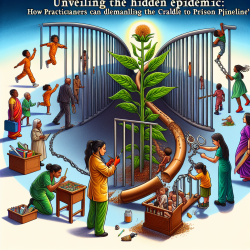Introduction
Imagine a health crisis so pervasive that it affects a quarter of all children in several major states. The Cradle to Prison Pipeline is such a crisis, as described in the research article "The Cradle to Prison Pipeline: An American Health Crisis" by Marian Wright Edelman. This phenomenon represents a systemic failure that criminalizes poor and minority children, setting them on a path toward incarceration rather than productive adulthood. As practitioners in the field of education and therapy, understanding and addressing this issue is crucial.
Understanding the Cradle to Prison Pipeline
The Cradle to Prison Pipeline is a complex network of social, economic, and political factors that disproportionately affect African American and Latino children. These factors include limited access to healthcare, underperforming schools, broken child welfare systems, and a culture that glorifies violence. Together, they create an environment where children are more likely to end up incarcerated than to succeed in life.
Key Findings from the Research
The research highlights several critical issues:
- Healthcare Access: Nine million children in America lack health insurance, leading to untreated physical and mental health issues.
- Educational Disparities: Schools in economically depressed areas often lack the resources to identify and address learning and behavioral disorders.
- Zero-Tolerance Policies: These policies result in the expulsion and arrest of students for behaviors that are often misunderstood.
Actionable Steps for Practitioners
As practitioners, you have the power to influence change by implementing the following strategies:
- Advocate for Policy Change: Support legislation that guarantees comprehensive healthcare for all children, including mental health services.
- Promote Community Programs: Encourage the development of community health delivery programs like the Nurse-Family Partnership and the Harlem Children's Zone.
- Foster Inclusive Education: Work towards creating an educational environment that recognizes and supports children with learning and behavioral disorders.
Encouraging Further Research
While the research provides a comprehensive overview of the Cradle to Prison Pipeline, further studies are essential to develop targeted interventions. Practitioners should consider collaborating with researchers to explore innovative solutions and share successful practices.
Conclusion
The Cradle to Prison Pipeline is a significant health crisis that demands immediate attention. By understanding the factors contributing to this epidemic and taking actionable steps, practitioners can play a vital role in dismantling this pipeline and creating a brighter future for all children.
To read the original research paper, please follow this link: The Cradle to Prison Pipeline: An American Health Crisis.










